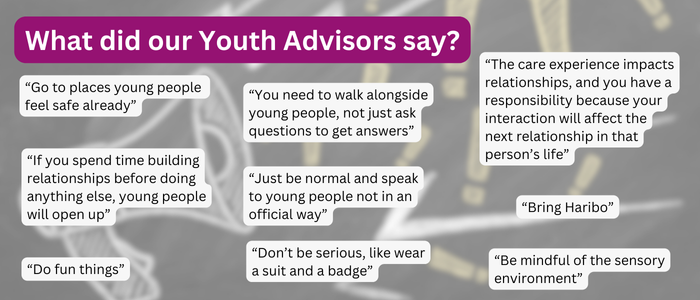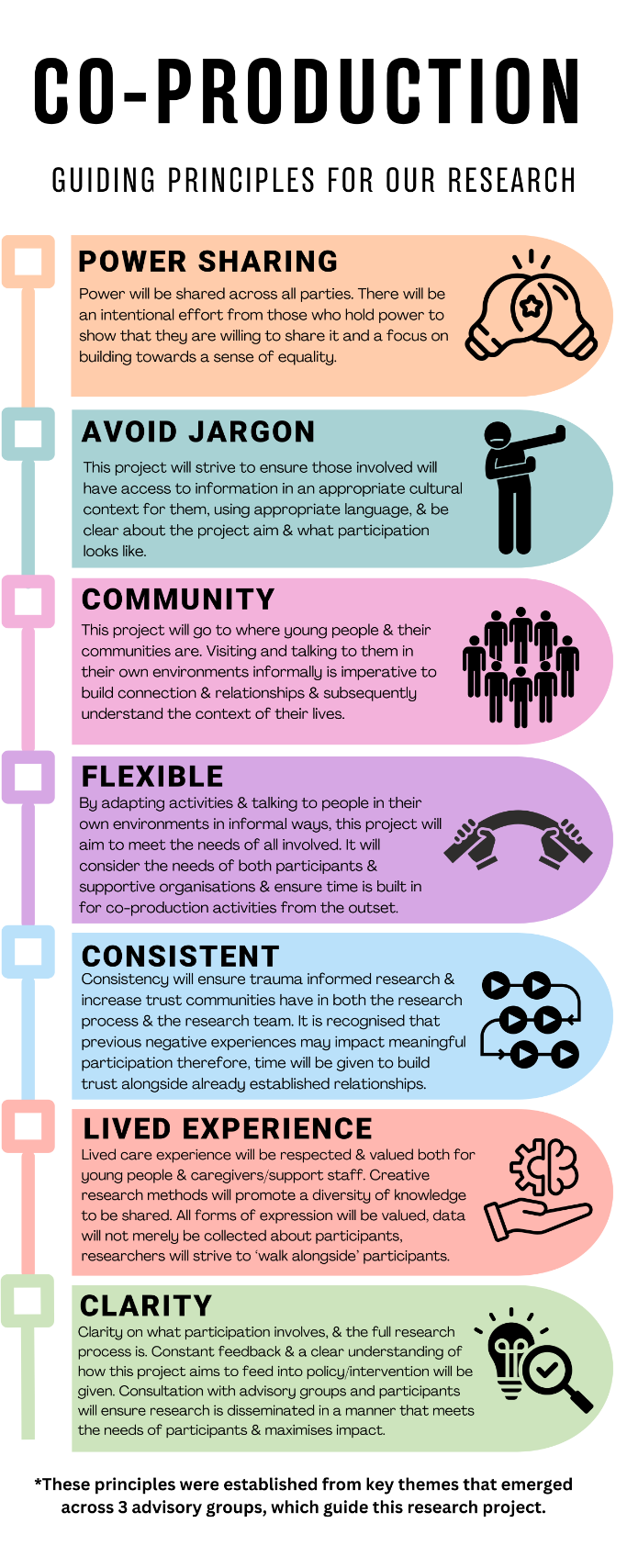My Journey to Co-production
Published: 1 November 2024
Craig Houston delves into the importance of co-production in research, emphasising the need for collaboration and respect for the lived experiences of care-experienced young people.

It’s 2021 and I am out walking in the East End of Glasgow with a care experienced young person. As a Social Care professional, we are out today to do some exercise and get lunch in the community. We approach Alexandra Park, it’s a beautifully sunny day, where better to do some circuits and have lunch than in a sunny Glasgow park, right?!
The young person turned to me and said,
‘I can’t go in there.’
My brain jumped straight to concern for physical safety, thinking ‘territorial conflict.’
I enquired ‘why not?’
The response hit me like a ton of bricks….
‘People like ME don’t belong there.’
He was not concerned about his physical safety at all; his emotional safety, however, was in danger by entering this beautiful park! This young person had navigated multiple hostile environments throughout his life, but this aesthetically pleasing space was a step too far.
This interaction checked my assumptions, beliefs and bias, instigating an internal Q&A: what is ‘accessible’, what does ‘safety’ mean and where ‘can’ young people go? The responses to this began a journey which has led me to vacate my social care routes for a research position exploring what, when, how, and why of community spaces as something that impacts feelings of social connection for care experienced young people.
The Role of Research
Before I began this transition, I spent a great deal of time reflecting on my experience working with researchers who attended the service I worked. There were undoubted benefits. I witnessed young people prosper sharing their reality, reflecting on their lives and learning through the research process. Although, this was not a universal experience. Some young people felt excluded in the research process, culturally overlooked and treated like ‘a novelty,’ describing researchers as ‘parachuting’ into their lives to ‘get what THEY needed.’ Describing a transaction, cold in nature and devoid of noticeable value for our young people.
The process often felt unequitable, one party enjoyed the riches of research whilst the other was left deflated and unappreciated. There was a lot I did not know beginning my journey as a researcher however, I knew I never wanted to make young people feel this way.
I quickly came to the realisation that co-producing research with young people was of critical importance.
Co-production……eh?!
At is core co-production is a collaborative approach to research. Researching ‘with’ and not ‘on’ communities can ensure that research is relevant, actionable, and beneficial to the communities involved. Brilliant! Let’s get the young team involved! This is going to be great, collaborative, ethical and meaningful. I began my journey to understanding co-production, which involved reading and reading and reading and...reading!!!
And what did I learn from all this reading?... …no one agrees what co-production is, or even if it is beneficial?! A blow to both my ego and experience, I panicked,
‘Why can’t I find what I am looking for?!’
This became my unofficial mantra alongside thoughts of;
‘Where do I start?’
‘How is co-production done well?’

For the first time I felt like academia might not have all the answers...I know, shock horror! After MUCH deliberation I decided to go back and hear from the real experts - the voices of care experienced young people.
Experts by experience
I decided to not only consult care experienced young people but also supporting organisations, recognising that care experienced young people are not a homogenous group, existing within complex social systems.
Three advisory groups were born:
- Senior Management
- Youth Advisory ‘insert cool name’ (that is what they decided it should be called)
- Practitioner
The Advisory Groups have challenged me to think differently about how best to co-produce research. Academic research is often plagued by, at times quite accurate, stereotypes. The most prominent of these, perhaps, being that academics are all knowing. I nearly fell prey to that! Creating an array of research questions, and methods, that I felt pertinent and valuable…….however, the Youth Advisory Group had different ideas!

*all quotes taken from our ‘Insert cool name’ Youth Advisory Group.
It was fascinating that despite all groups agreeing that community spaces and social connectivity were key issues, exactly what was important to them would not have been answered by the research questions considered prior to consulting the Advisory Groups. This amended my research course – one huge and immediate benefit of early engagement with the true experts. Still left me wondering though…..
I still don’t know what Co-production is!
So…I asked our Advisory Groups two questions:
1. ‘What do WE want co-production to be?’
We identified it as;
Young People having the opportunity to be involved at every stage of the research process.
2. ‘How do we embed co-production?’
Discussions highlighted seven key themes, which became our ‘Guiding Principles.'

So what?
It has given the research team and I a unique opportunity to develop skills, keep us accountable, hear people’s stories and serves as an important reminder as to why I am doing this research.
Not only do I feel this is a way of conducting ethical, trauma informed research, it is fun! It has given the research team and I a unique opportunity to develop skills, keep us accountable, hear people’s stories and serves as an important reminder as to why I am doing this research.
For all too long, research has missed the target and been siloed in our communities. It would be remise of me to suggest co-production is a magic pill, however it is an opportunity (not one that should be taken lightly!) to engage communities throughout the research process. I would suggest we have an ethical responsibility to do so. Who knows, perhaps prioritising co-production and researching WITH our communities, on topics that have meaning in THEIR LIVES we could simply begin to bridge the gap that exists between research, communities, and meaningful social change.
I suppose only time will tell.
Take it easy!
First published: 1 November 2024
<< 2024

